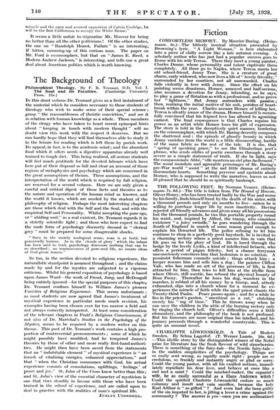The Background of Theology
IN this stout volume Dr. Tennant gives us a first instalment of the material which he considers necessary to those students of theology who wish to make sense of their special science ;
grasp " the reasonableness of theistic conviction," and see it in relation with human knowledge as a whole. Those members of the clergy who have taken to heart recent episcopal hints about " keeping in touch with modern thought " will no doubt view this work with the respect it deserves. But we can hardly hope that they will find themselves able to study it in the leisure for reading which is left them by parish work. Its appeal, in fact, is to the academic mind ; and the abundant food which it offers needs a digestive apparatus already well trained to tough diet. This being realized, all serious students will feel much gratitude for the devoted labours which have here put at their disposal so full and clear an account of those regions of metaphysics and psychology which are concerned in the great assumptions of theism. These assumptions, and the interpretation of the world which is required by full religion, are reserved for a second volume. Here we are only given a careful and critical digest of those facts and theories as to the nature and operation of the human mind as knower, and
the world it knows, which are needed by the student of the philosophy of religion. Perhaps the most interesting chapters are those which deal with the Self and the Soul, and with the empirical Self and Personality. Whilst accepting the pure ego, or " abiding soul," as a real existent, Dr. Tennant regards it in a strictly scientific light ; and those who here expect to find the nude form of psychology discreetly dressed in " clerical grey " must be prepared for some disagreeable shocks.
" Save in the merely zoological sense, man is at birth but potentially human. As to the clouds of glory' which the infant has been said to trail, psychology discovers nothing that can be so described ; no reminiscences of pure-soul life, no innate ideas of Clod-given reason."
So too, in the section devoted to religious experience, the naturalistic standpoint is assumed throughout ; and the claims made by and for the mystics are subjected to a vigorous criticism. Whilst his general exposition of psychology is based upon James Ward—the work of Freud, Jung, and McDougall being entirely ignored—for the special purposes of this chapter Dr. Tennant confines himself to William James's pioneer Varieties of Religious Experience. This seems unfortunate ; as most students are now agreed that James's treatment of
mystical experience in particular needs much revision, his examples having been chosen over far too narrow a field and not always correctly interpreted. At least some consideration
of the relevant chapters in Pratt's Religious Consciousness, if not also of Dr. Marechal's Studies in the Psychology of the Mystics, seems to be required by a modern writer on this theme. This part of Dr. Tennant's work contains a high pro- portion of controversial pronouncements ; some of which he might possibly have modified, had he tempered James's theories by those of other and more really first-hand authori- ties. He might then have been saved from the statements that an " indubitable element " of mystical experience is " an inrush of vitalizing energies, enhanced appreciations," and that " when the Christian communes with God, his actual experience consists of consolations, upliftings, `feelings' of peace and joy." St. John of the Cross knew better than this;
and St. John's view of the essential character of mysticism is one that rises steadily in favour with those who have been trained in the school of experience, and are called upon to deal in practice with the realities of man's spiritual life.
EVELYN. UNDERHILL.




































 Previous page
Previous page